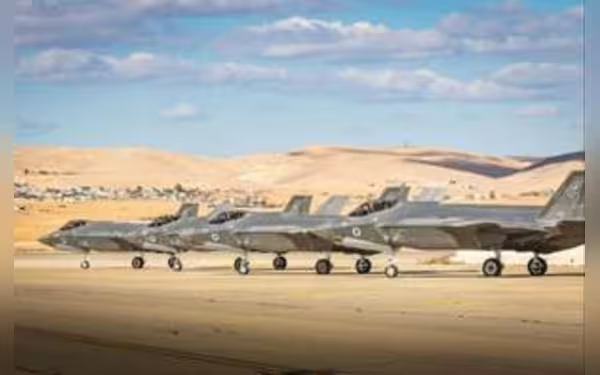Saturday, November 16, 2024 07:44 PM
Israeli Military Plans Significant Response to Iranian Missile Attack
- Israel prepares serious response to Iranian missile strike.
- Hezbollah increases rocket fire amid escalating tensions.
- Humanitarian crisis worsens with over 1,110 deaths in Lebanon.
 Image Credits: nation_pk
Image Credits: nation_pkIsrael plans a significant military response to Iran's missile attack, escalating tensions in the Middle East amid a worsening humanitarian crisis.
In recent days, tensions in the Middle East have escalated dramatically, particularly between Israel and Iran. The Israeli military has announced that it is planning a "serious and significant" response to a ballistic missile attack launched by Iran. This attack, which occurred on Tuesday night, involved approximately 200 missiles aimed at Israel, marking a notable escalation in hostilities between the two nations. The Israel Defense Forces (IDF) have made it clear that Iran's actions will "have consequences," indicating a strong military response is forthcoming.
The missile strike from Iran was reportedly in retaliation for a series of Israeli operations that targeted militant leaders in the region. This attack resulted in one fatality in the Israeli-occupied West Bank and caused damage to an Israeli air base, as evidenced by satellite imagery. The situation has intensified further, with Israeli ground forces conducting raids into Lebanon, following a period of heavy bombardment of Hezbollah positions. This shift in focus from Gaza to Lebanon signifies a potential widening of the conflict.
Hezbollah, the Iran-backed militant group, has also been active, with reports of increased rocket fire directed at Israel. A high-ranking source within Hezbollah indicated that communication with their potential new leader, Hashem Safieddine, has been lost following recent airstrikes in Beirut. This comes after the assassination of Hassan Nasrallah, the previous leader, which has left the group in a state of uncertainty.
As the violence escalates, analysts are closely monitoring Israel's next moves. A military official, who spoke anonymously, stated that the IDF is preparing a response to what they describe as an "unprecedented and unlawful Iranian attack." The nature and timing of this response remain unclear, but it is expected to be significant, despite international calls for de-escalation.
In the broader context, the ongoing conflict has resulted in a humanitarian crisis. Reports indicate that over 1,110 people have died in Lebanon since September 23 due to intensified Israeli strikes on Hezbollah strongholds. The UN has expressed concern over the situation, with the head of the UN refugee agency highlighting the dire conditions faced by those displaced by the violence.
As the situation continues to unfold, the international community watches closely. The United States, a key ally of Israel, is reportedly working to prevent the conflict from spreading further. Meanwhile, Iran's Foreign Minister has called for ceasefires in both Gaza and Lebanon, emphasizing the urgent need for peace in the region.
The current state of affairs between Israel and Iran is precarious, with both sides engaging in actions that could lead to further escalation. The potential for a broader conflict looms large, and the humanitarian impact is already being felt across the region. As the world looks on, the hope remains that diplomatic efforts can prevail to bring about a ceasefire and restore peace to a region long plagued by violence.













